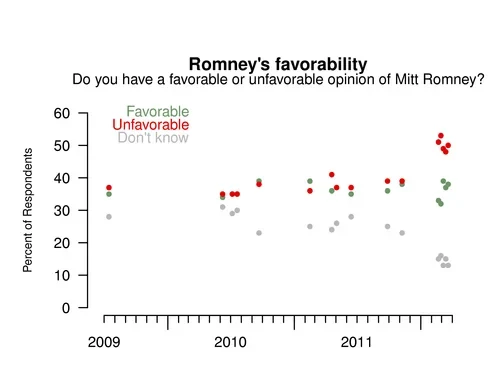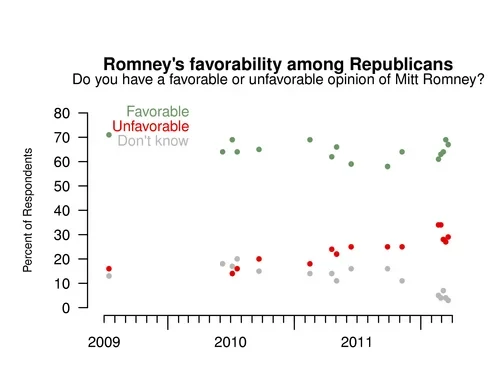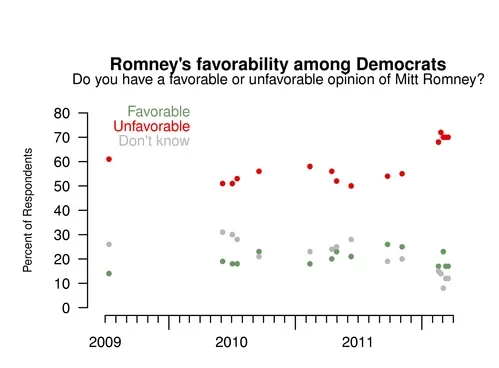As they consider how to improve their candidate’s image in the lead-up to a likely general election campaign, Mitt Romney’s advisors should be aware of a perplexing (for them, at least) trend in the public’s response to the former Massachusetts governor –- as Americans have learned more about Mitt Romney, they have tended to adopt negative rather than positive overall views of him.
Consider the graphic below, which plots Romney favorability across weekly polls conducted by YouGov since 2009. The percentage of respondents indicating they do not know enough about Romney to have an opinion of him, represented by the gray dots in the graphic, has been gradually declining since Romney announced his second bid for the presidency in June 2011. However, the decline in Americans who don’t have an opinion about Romney has NOT been accompanied by an increase in the percentage of Americans who have a favorable view of him (indicated by the green dots), a figure that has remained rather stable. Instead, just about all of the decline in “don’t knows” has been soaked up by a large increase in the percentage of Americans who have an unfavorable view of Romney (indicated by the red dots), especially since the beginning of 2012.

Interestingly, the same basic trend (i.e. a declining a percentage of “don’t knows” and a growing percentage of “unfavorables”) can be seen across respondents of different partisan categories. Among Republicans as among Democrats, unfavorable views of Romney have grown at the same time as reported ignorance about Romney has shrunk. (Among Republicans, it should be noted, there also appears to have been a slight increase in the percentage of respondents with favorable views of Romney).


What is at the heart of the growth in unfavorable views toward Romney? Data limitations prevent me from being able to provide a thorough answer to this question. The data that do exist, however, give some insight into what the public may be thinking. In particular, it appears that a growing percentage of Americans are buying into what has become the dominant negative narrative about Romney – the notion that he is a vacuous politician devoid of core beliefs who will say anything to get elected. For example, since December 2011, YouGov has periodically been asking respondents in its weekly polls whether they think Romney “says what he believes” or “says what people want to hear.” As the table belows, a growing percentage of respondents are answering that Romney says what people want to hear, and a declining percentage are answering that they aren't sure. Results for last week's survey (conducted RIGHT BEFORE the "etch-a-sketch" fiasco) represented a reversal of this trend, but it is unclear whether the reversal is an indication of a long-term improvement in Romney's image or a temporary blip on the radar screen. Given the fallout from etch-a-sketch, though, it seems likely that the data will revert to previous form...for now.
Views about Romney's Sincerity over the Last Three Months
| Date | Says what he believes | Says what he thinks people want to hear | Not sure |
|---|---|---|---|
12/31 - 1/3 | 20% | 48% | 32% |
1/14 - 1/17 | 18% | 58% | 24% |
2/04 - 2/07 | 19% | 57% | 25% |
2/11 - 2/18 | 15% | 59% | 25% |
3/03 - 3/06 | 18% | 61% | 21% |
3/10 - 3/13 | 17% | 61% | 21% |
3/17 - 3/20 | 21% | 57% | 22% |
Romney's advisors almost certainly know that they have a major image problem on their hands, and that they need to do something to change the conventional wisdom that has emerged about their candidate. Over the coming months, as Romney and his crew attempt to repair some of the damage to his image, I'll be periodically providing updates from YouGov's weekly polls to see how successful they are. Stay tuned.









